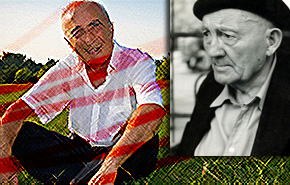Page 1 Page 2 Page 3 Page 4 Page 5

When she made a slip of the tongue and called him by the name of another boy, he sat frozen in rage and humiliation, hoping that if he held very still he would not have heard it. She buried her face in his chest, but it was too late; he knew the end was coming. Two months later, as summer began, she disappeared — actually vanished from the earth. Her mother’s voice said she was visiting her grandparents, that is her aunt, in Raleigh, N.C., but the address slipped her mind. An agonized hour later, her mother in the flesh said: “Elliot, I have to leave. I don’t have time to talk to you now.” In a frenzy of despair, he parked outside her house, but everyone who went in or out said they knew nothing and told him to go home. He trapped her young sister playing in the nearby park and threatened her; she gave him an address in Lynchburg, Va. He wrote letter after letter, but they all evaporated.
Love that summer suffered a slow and excruciating death; only as he went off to college did it give its last shiver. He buried its remains where no one could ever find it again. His rapacity remained, but it was sterile and unsatisfying, unredeemed by love. When it was no longer an outpouring of love as well as the seeds of love, it became a physical act of increasing ludicrousness and inconvenience. It was only with great difficulty and waste of valuable time that a girl could be persuaded to join him in this nonsense, and those who did soon began demanding a share of that which was dead in him. He gave up on them and turned to their professional sisters. But this was expensive, and, furthermore, he grew weary of their filth, their ignorance, and their gum-chewing vacuity. He learned that he needed no one; he could take care of his needs by himself.
After two years of boredom and sloth, he was encouraged to seek an educational opportunity more suited to his interests, and he left the university. A year in the community college did not make the study of business any less boring, and he abandoned higher education for a position in the “real world.” For years he trudged along the lines of time as a clerk for a shipping company, drifting alone, friendless, uncaring, surviving in a small, dusty apartment. He ate all his meals in fast food restaurants, and food still tasted wrong.
That was all there was — eating, sleeping, working, moving across and back, television, an occasional tryst with himself. There was no pleasure in any of it, but it was all there was.
One warm day in April, as the juices were beginning to run in animal and vegetable alike, he saw himself for the first time, just as he was to see himself once more in another day. He saw what he was and where he was. He saw himself existing without pleasure and without meaning. The lowliest forms of life, the very mosquitoes that merely reproduced and then died in a martin’s gullet lived with more purpose than he did — at least they replicated themselves. His carnal efforts were sterile and impersonal, and his body would nourish only the maggots. Most of all, he felt the lack of happiness; he hardly knew what the word meant. He realized he had robbed himself, and he resolved to recover his lost happiness, forgetting that he had never had it.
Perhaps to father a child would bring him fulfillment and happiness; others claimed it did, as unlikely as that seemed. He thought briefly of possible mothers who would create a minimum of bother for him; his years of rejecting emotional attachments had so dried his heart that he could go no deeper than that. He quickly settled on a bespectacled typist in the office pool above his warehouse. She was constantly hinting at dates and leering at him grossly; no doubt she would be willing to bear him a child for the pleasure of his company. She was pleasantly surprised by his invitation to dine that night, and more than surprised by his subsequent invitation for her to move into his apartment. However, she was afraid to let such an opportunity pass her by; after all, she was nearly twenty-three.
It was a difficult disruption of his solitary routine, but there were some advantages in having a fellow creature in his home. She cooked fairly well, better certainly than the chefs at Burger King. She was affectionate, and he could take his pleasure with her any time he cared to; at those moments she became his poor little bouncing lost love bent into the back seat of a compact car. Unlike her, this one was easily satisfied, and since she asked nothing of him he grew tolerant of her presence, in spite of a few peculiarities of sounds and mannerisms.
After three weeks, when he judged that enough time had elapsed, he brought up the main subject.
“A baby!” she exclaimed. “Oh, darling, yes! You crazy man, what a way to ask!”
“Well, I don’t know about that. I thought it was — “
“When? When shall we do it?”
“Oh. Well, how about right now?”
“Now! You silly, we have to get blood tests, license, arrange —”
“Blood test? What blood test?”
She stared at him.
“What blood test?” he repeated.
She wept quietly all evening, and by midnight she was gone. Only then did he realize he had carelessly left the door open again, and part of his elaborately imprisoned manhood had escaped. He wanted her back.

